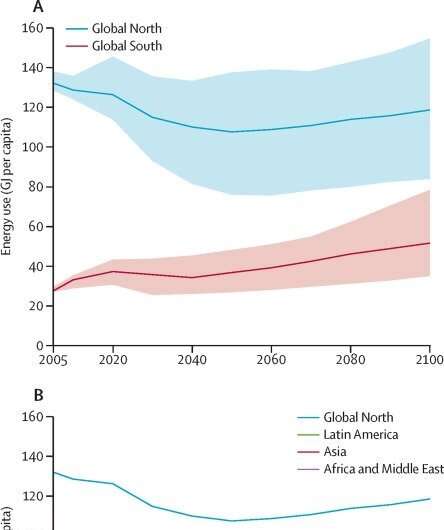Reduction of global inequalities in energy use necessary to stop climate change

A new ICTA-UAB study shows that existing climate mitigation scenarios perpetuate inequalities in energy use between the Global North and the Global South long into the future. These scenarios disadvantage the Global South and are therefore politically untenable.
A just energy transition that keeps global warming below 1.5 or 2°C requires the wealthy countries in the North to reduce their energy use to sustainable levels of consumption, while allowing for a sufficient growth in energy use in the rest of the world.
These are the conclusions of a scientific study by the Institute of Environmental Science and Technology of the Universitat Autònoma de Barcelona (ICTA-UAB), conducted by researchers Jason Hickel and Aljoša Slameršak and published today in The Lancet Planetary Health, in which they call for the development of new climate mitigation scenarios that would achieve energy convergence between the Global North and the Global South, and thus gradually eradicate the energy privilege of rich countries.
The urgent challenge of climate mitigation is made difficult by high rates of energy use in wealthy countries, mostly in the Global North, which far exceed what is required to meet human needs. The study emphasizes that the world's wealthiest 5% use more energy than the poorest half of the global population combined. In contrast, more than 3 billion people in the poorest countries live in energy poverty, and 780 million people do not have access to electricity. The core countries of the Organization for Economic Co-operation and Development (OECD) and the rest of Europe use on average about 130 gigajoules of energy per capita each year, nearly ten times more than what low-income countries use.
"Much of this excess energy is consumed by forms of production that support corporate profits and elite accumulation, such as fast fashion, sports utility vehicles, industrial meat and planned obsolescence, which have no relevance to well-being," says Aljoša Slameršak.
In the analyzed scenarios, African and Middle Eastern countries are assumed to have their energy use limited at their existing rates for most of the century, i.e., less than 30 gigajoules per capita per year. By contrast, the OECD countries and the rest of Europe are on average allocated energy well in excess of 100 gigajoules per capita per year for the rest of the century. Even though Latin America and Asia see some increase in energy use, their energy consumption amounts to barely half of what countries in the Global North consume in 2100.
In existing mitigation scenarios, the North's energy privilege is sustained by suppressing energy use in the South, and by betting on negative emissions technologies, which are based on the appropriation of biomass from the forest-rich Global South.
The study shows that effective climate action requires reducing energy inequalities between the Global North and the Global South. "The Paris Agreement calls for a just transition, and the Intergovernmental Panel on Climate Change (IPCC) recognizes that current patterns of consumption among the global rich are unsustainable," says Jason Hickel.
The authors emphasize that the planet is finite, and it should be shared fairly. To stop climate breakdown and achieve human development for all, scenarios and strategies for radical convergence are needed at a sufficient level to ensure human well-being and be compatible with rapid decarbonization.
More information: Jason Hickel et al, Existing climate mitigation scenarios perpetuate colonial inequalities, The Lancet Planetary Health (2022). DOI: 10.1016/S2542-5196(22)00092-4
Journal information: The Lancet Planetary Health
Provided by Autonomous University of Barcelona




















